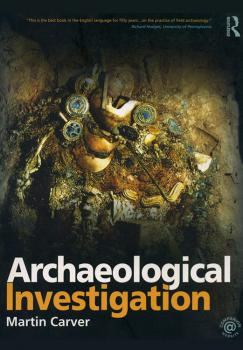Archaeological Investigation

Publication Year:
2009
Archaeological Investigation is a modern manual on field practice for students, academics and contract researchers.
"This is the best book in the English language for fifty years or more on the practice of field archaeology" Richard Hodges, Director of University of Pennsylvania Museum
"Accessible, comprehensive and interesting - a bible for field archaeologists" Claire Smith, President, World Archaeological Congress
"Written by one of our finest excavators, distillng a lifetime's experience. Comprehensive yet provative, it's a "must read" for both student and professional alike" Graeme Braker, Director of the Macdonald Institute, University of Cambridge
Drawing its numerous examples from Britain and beyond, Archaeological Investigation explores the procedures used in field archaeology travelling over the whole process from discovery to publication.
Divided into four parts, it argues for a set of principles in part one, describes work in the field in part two and how to write up in part three. Part four describes the modern world in which all types of archaeologist operate, academic and professional. The central chapter ‘Projects Galore’ takes the reader on a whirlwind tour through different kinds of investigation including in caves, gravel quarries, towns, historic buildings and underwater.
Archaeological Investigation intends to be a companion for a newcomer to professional archaeology – from a student introduction (part one), to first practical work (part two) to the first responsibilities for producing reports (part three) and, in part four, to the tasks of project design and heritage curation that provide the meat and drink of the fully fledged professional.
The book also proposes new ways of doing things, tried out over the author’s thirty years in the field and brought together here for the first time. This is no plodding manual but an inspiring, provocative, informative and entertaining book, urging that archaeological investigation is one of the most important things society does.


